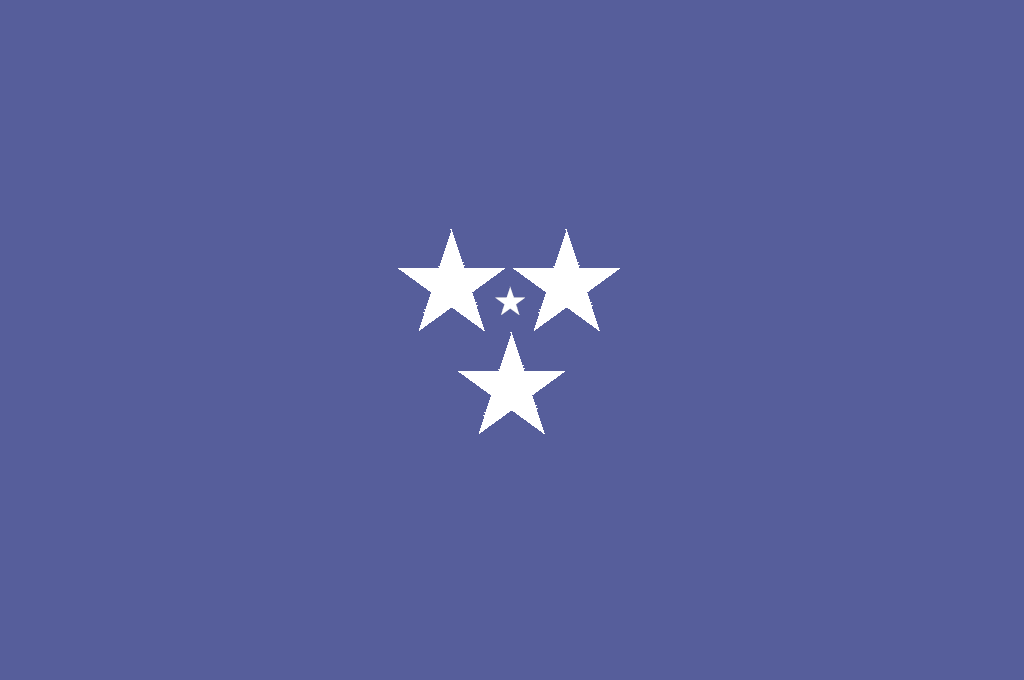Fortis
|
United Federal Republic of Fortis
Фортис Република Савезна (Fortis Savezna Republika)
|
|||||
|---|---|---|---|---|---|
 |
|||||
| The Three Large Stars of Fortis - Laythia, Troakia, and The Baskay, and the star that unites them, the Pact of Fortis | |||||
| Motto | On the Baskay, We Protect | ||||
| Common Name | Fortis | ||||
| Anthem | Final Pride | ||||
| Demonym | Fortisian | ||||
| Official languages | Laythi, Kalbanian, West Hook Pidgin (Veiid Zokesian, Laveskan) | ||||
| Currency | Fortis Stotinu or Stotinu | ||||
| Politics | |||||
| Capital | Fedithe F.O. | ||||
| Government | Federal presidential constitutional republic | ||||
| President | Tedior Roovich | ||||
| Preceded by | Laythia and Troakia | ||||
| Demography | |||||
| Ethnicities | Kalbanian, Laythi, Zokesian, Others (less than 5%) | ||||
| Population | est. 6,000,000 - 6,010,000 , last census 5,995,134 | ||||
| Area | ??? km² km² | ||||
Fortis, Officially the Federal Republic of Fortis, is a protectorate of the UIF and a union state formed from the binding of two nations, Laythia and Troakia. Fortis was born from the collapse of Laythia, after the communes began to fail spectacularly, and communalist thought fell out of favor for more moderate democratic ideals. Seeing the oncoming collapse, Troakian and Laythian nationalist leaders, especially those more clued into world politics, saw the writing on the wall. Coming together, they formed the Pact of Fortis, or the Pact of Strength, a unilateral and bi-partisan treaty first allowing for some stabilizing measures in both countries. These measures would eventually come to a head in late 2134, when both nations dissolved their formal and previous governments. This made way for the new nation of Fortis, formed the same year from both countries.
On the History of Fortis
The “Downturn Era”
The economic downturns that are oft seen in Veiid and the Kalbans eventually ground down the Laythian Communes to near depression. Multiple recessions to the north had also devolved Troakia into near dissolution. The bleak outlook, especially from the more economically liberal think tank “Фортис Унилатерал Ецономиц Цоммиссион”, or The Fortis Unilateral Economic Commission, warranted extreme measures to combat what seemed to be a rapid downfall into an unrecoverable depressed economy. The commission, a group of 100 staffers and economists based out of Fedithe (Which readers will recognize as the now Capital, Federalni Okrug, Fedithe or Fedith F.O.), proposed a series of cultural, economic, and even political reforms that, to the average Laythian citizen, would have seemed outrageous – a reorganization of the communes into more capitalistic towns, cities, counties, and metropolitan areas, and even a proposal to make cultural and diplomatic ties with the neighboring Troakia. However, with desperation settling in and food riots becoming more common, the inter country governments and municipalities, perhaps to the surprise of the ordinary citizen, ultimately approved the effort. A large, countrywide vote was placed, and the reorganization, taking place between 2126-2130, went forward. Similar reforms began to take place in Troakia, and by 2132, both countries established the Fortis Pact.
The Fortis Pact
The Fortis Pact established a number of goals for both the Laythian and Troakian Interim governmental system to meet, including a number of public works overseeing infrastructure projects, healthcare reforms, and trade reforms. A number of tariffs held on Kalban goods were instituted, as no overt government was in place in the Kalban region to formally protest. With no real possibility of a trade war over Kalban goods, and with no pre-existing tariffs on goods from other Baskay area countries, the economic downturn at first slowly reversed itself. The Fortis Pact Public Works program, overseeing the demolishing and reconstruction of multiple ports throughout the area, as well as the rapid reindustrialization of the region thanks in part to the newly established Fortis Heavy Industries and Redoubt Energy Systems, led to a skyrocketing revitalization of the economies of both Laythia and Troakia. By 2134, the lines between Troakia and Laythia, despite prior tensions, had blended so considerably that the nation of Fortis would be established in a formal dissolving of the prior governments.
The UIF Era
“A member in name only, woe, how it is to be a mere protectorate!” - Tediore Roovich, President of Fortis as of 2163-2182, then leader of the Hook Seariders, 1st Battalion, 7th Regiment.
By no means a secret, if not outright stated in current Fortisian diplomatic missions, the nation of Fortis found itself at odds in the late 2150s with the now defunct New Kalban Rrpublic, and some tensions also existed to the far north with the nation of Belka. A near civil war had also broken out when, despite an oddly well-functioning economy, a royalist faction, claiming ownership of the country, led a number of raids across northern Laythia, but ultimately were destroyed. Seeing the incredible restoration of the UIF two years earlier in 2150, Fortisian leaders began to think about application into the union as a member state. However, certain cultural ideals, especially in regards to a distaste to answering fully to a military command so far away, led Fortis down another path – entrance as a limited protectorate. In such a state, Fortis would not be beholden to UIF command, but would also not gain complete backing by UIF forces. However, by providing West Hook Island’s Sea Command and Squadron (WHI-SEARON) facilities on a “political” lease to the UIF (where the UIF would not pay upkeep), as well as to the allied nation of Zokesia, Fortis gained a near guaranteed, friendly, and relatively like-minded ally in its back pocket. Ultimately, Fortis applied to become a UIF Protectorate, and was later granted the position in the late 2150s. Today it remains as such, and though critics like current president Tedior Roovich abound, even those with a critical eye like Roovich himself admit that the shame of being partially under the thumb of the UIF has remained well worth the benefits. The NKR was not able to formulate any military in-roads into Fortis, and in fact had to rely on Fortisian money to keep itself solvent Before ultimately collapsing, and many other nations around Veiid and the Baskay were also, thankfully for the populace of Fortis, cowed away from any land grabs.
Leaders
Fortis
Government
Fortis has a unicameral legislature, modelled off of other past and present Federal Republics, but maintains a very strong "Personal and Individual" attitude towards rights, with local areas receiving a great deal of autonomy, such as the ability to decide at the local level on the legality of Drugs, Alcohol, and other contentious items. There exists a Supreme Court, which decides at the national level on cases that may affect the entire nation, an Executive branch, which includes the President and his cabinet of advisors, and a Senate, comprised of representatives of local provinces, which vote on various national level laws.
At the local level, Provinces maintain a high degree of authority, but can in some cases answer to the Federal Government, such as with the Right to Bear Arms, or the Right to Free Speech and Press.
States
South Laythia - Bordering the Greater Baskay, South Laythia is also the current seat of the government, with the capital Ustioniburg located on its shores. West Laythia - West Laythia - Neighboring the New Kalban Republic. It is home to a large industrial base that to this day is still recovering from the massive civil wars of the old era. North Laythia - The Northern Province of Laythia. Also contains a fair amount of former Laythian Coastline. Very rural, with most population centers being only medium sized cities. Troakia - The former country of Troakia, now a province in Fortis. West Hook Island - No stranger to the changing of hands, West Hook joined Fortis alongside Troakia, and is responsible for a great deal of Maritime related industry.
Economics
Fortis, especially the former Laythian region, maintains high autonomy politically, but due to the failure of the commune system, the nation runs on a capitalistic economy, with private firms held by private citizens the rule of thumb for buisiness. However, certain industries remain nationalized, such as healthcare (though private clinics and insurance, though highly regulated, do exist). Fortis is not a high-GDP nation, but remains stable, with economic policy firmly entrenched in goals of stability rather than production.
Exports from Fortis are mostly maritime, with heavy shipbuilding as a major industry. Imports mostly include food, medicine, and consumer goods.
Industry
Fortis has, as of 2150, become a world-leader in submarine development, and spends a considerable amount of money on the research and development of both military and civilian sector in underwater vehicles. Fortis maintains a decent, but not top class aeronautical industry, and has a small but well funded space center capable of launching mid-grade rockets. Other non-notable consumer oritented heavy industry is spread throughout both the former Laythia and Troakia
Religion
“God is a Kerb” Though Fortis has no official state religion, a strong orthodoxy and patriarchal value exists in the form of the Veiidic-Baskayn Church, which has only become more powerful as time marches on. The ideals, however, of “What is Vikus belongs to Vikus, and what is God’s belongs to God”, keep the Baskayn Religion firmly separated from government matters. Religious tensions between citizens of Fortis and their southern neighbors, however, has steadily increased over the last decade, and more secular analysts worry that religious and ethnic tension will being the next yugo-veiid or kalban war.
Culture
Fortis is by no means a melting pot, but besides the strong Yugoveiid culture of the Laythi and the Kalbanian, a growing appreciation for (and small but growing population of) Laveskan and Zokesian culture exists inside of Fortis. A statistically large amount of Laveskan Zokesian settlers live on West Hook Island, as the well developed seaport there leases multiple slipways and air hangars for those respective countries (as well as the UIF itself, laveskan majority not withstanding)
Military Branches of Fortis
The Baskajska Mornarica, the naval department of the Fortisian Military, was established in 2134 alongside the state itself, and has a mandate of preventing piracy and war on the Baskay. Force projection as an ideal simply does not exist for the small maritime force, who has only a single, small escort carrier, the Forrester, meant for rapid deployment of air wings around the Baskay rather than for force projection around the world. The Navy's operating principal of "unseen threat" has lead to the rapid procurement of submarine task forces. Submarine tenders and sonobouys line the coasts around Fortis as a result, and the Navy maintains a small detachment of destroyers and even fewer cruisers as a result.
The Fortis Ground Patrol Force
As Fortis's interests are continental only, and as it relies heavily on the UIF's global hegemony, Fortis maintains only a small ground military, mostly comprised of infantry, mechanized vehicles, and rapid logistics. Tanks are very rare in Fortis, and are not seen as a critical part of the GPF.
= Fortis Air Forces
The Fortis Air Force is a small but well funded one that relies heavily upon rotor-wing craft to patrol a small area. Fixed wing fighters exist in the form of QRF-oriented Multi-role Strike fighters and ground attackers.
